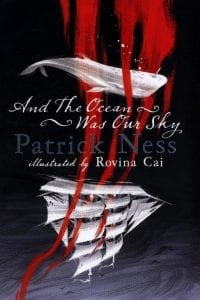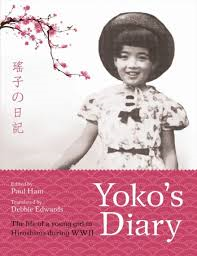 Patrick Ness, the author of ‘a Monster Calls‘ and ‘the Chaos Walking‘ trilogy, is known for looking at things from a different perspective – so the inverted point of view in ‘And the Ocean was our Sky‘ should come as no surprise.
Patrick Ness, the author of ‘a Monster Calls‘ and ‘the Chaos Walking‘ trilogy, is known for looking at things from a different perspective – so the inverted point of view in ‘And the Ocean was our Sky‘ should come as no surprise.
It is a tale told from the point of view of Bathsheba. Who or what Bathsheba is, takes a while for the reader to determine. However, when this comes about, it really turns your thoughts upside down.
Thankfully, there is some revelation of the setting in the beautiful illustrations of Rovina Cai. These play an integral part of the story, creating a time to pause and reflect on the events in the text. They are also a reminder that different worldviews exist; their swirling colours echo the turbulence of the tale. (Warning: some of these may upset young readers.)
Key character Bathsheba reluctantly works as an apprentice under Captain Alexandra, in brutal battles against their foe. She bemoans that she never wished to be a hunter, and it becomes clear that her acute thinking skills will come to the fore. She constantly questions the morality and reasons for their obsessive searches for the devil known as ‘Toby Wick’, and their aggressive hunt for ‘man-ships’.
‘And the Ocean was our Sky‘ begins with ‘Call me Bathsheba…’ – a line that mimics one from Herman Melville’s famous ‘Moby Dick’. Indeed, there are many clever nods to this famous tale – now told by Ness from a far different perspective, where the hunted becomes the hunter! Ness has also made some interesting choices when naming characters like Bathsheba, Alexandra, Demetrius and Wilhelmina – the work of a master craftsman, don’t you think?
The story questions the things which we may use to justify our actions, emotions and prejudices. Should there be a never-ending war, just because “So it has been, so it shall always be.”? Is the enemy real or a myth? Do we keep enemies in our minds without really knowing why? Can moral choice instead override the historical biases laid on a culture? Must Bathsheba continue to follow in her assigned role forever?
Below, Patrick Ness introduces his book:
# This was read as an audiobook – but fortunately with the beautifully illustrated copy on hand. This was definitely a time where the physical book was essential!!
## ‘A Monster Calls‘ was previously reviewed here.

